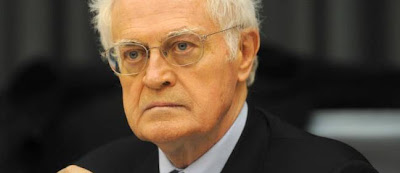A couple of months ago, in my blog post titled
Ring-ins [
display], I evoked the existence of a significant number of out-of-wedlock births among my Dorset ancestors. It goes without saying that my observations were totally devoid of any kind of moralistic dimension. I wasn't scolding posthumously my naughty ancestors for cuddling furtively in the haystacks of Iwerne Courtney and rearing single-parent offspring who carried a surname, Skyvington, which was not in fact that of their biological father.
Cricket ground at Iwerne Courtney (photo David Squire).
My interest in such questions is inspired by two more subtle reasons.
— First, other individuals named Skyvington, living today, are interested in their origins. These people are likely to appreciate my Dorset research into recent Skyvington branches beyond my own direct ancestral line.
— Second, there's the question of our Y chromosomes. Up until now, this subject remains purely theoretical, because I seem to be the only person with a name like Skeffington who has put his Y-chromosome results in the database [
access].
Well, a few days ago (on the same day, amazingly, that I heard about the family
de Verdun), I was happy to discover that present-day Skyvington individuals in the vicinity of Worcester (named
Stephen,
Richard,
Gary,
Robert and
Shaun) and Durham (named
Robert,
John and
Graeme) would appear to be authentic genetic cousins, with exactly the same Y chromosome data as me. (For the moment, I don't have the addresses or phone numbers of any of these individuals.) It would be nice if some of these people were to obtain their Y chromosome specifications through, say, the Family Tree DNA company [
access]. Incidentally, I believe that the best approach, costwise, is to order a test through the Skeffington group, whose page exists on the Family Tree DNA website.
For readers interested in the precise links between the English Skyvingtons in Worcester/Durham and myself, let me display a couple of genealogical charts. Their ancestor
John Skyvington [1857-1901] worked as an agricultural laborer, at the age of 14, in Iwerne Courtney, before becoming a stonemason. But his principal vocation was the army, and he entered the ranks of a distinguished corps: the
Royal Horse Artillery. It was no doubt in his role as a dashing mounted trooper that John met up with a young Scottish lady,
Jessie Coulie (also spelt as Collie), who became his wife. Later, John was on active service in the Boer War.
Ambush at Sannas Post (Blomenfontein, 1900) by Terence Cuneo.
John is the person mentioned down in the lower left corner of the following chart (where I have retained the baptismal spelling of his surname):
The following chart, of an earlier epoch, mentions John's father
George and his elder brother
Charles, who was my 3-great-grandfather:
In other words, the couple at the top of this chart,
John and
Grace, were the most recent common ancestors of the English Skyvingtons in Worcester/Durham and myself.
Getting back to the man who served in the Boer War, there's a family legend concerning the identity of his wife Jessie Coulie. It was said that she was the daughter of a noble family associated with Guthrie Castle near Dundee, and that she was normally destined to wed an equally noble chap from India. To escape this fate, she eloped with John Skivington!
If John's wife never made it to India, his nephew
Edwin Skivington (son of the Edwin mentioned in the first chart) ended up there in 1916, as a soldier with the 7th Hampshire Regiment.
A final detail concerning John Skyvington has caused me to meditate upon the quirks of fate. To enter the ranks of the Royal Horse Artillery, John must have been an experienced horseman. And I would imagine that he acquired his skills in that domain as a youth, working as an agricultural laborer in his Dorset village. It appears that John lost his life prematurely through being kicked in the head by a horse. Since it has been said that John was killed in the Boer War, we might imagine that this fatal accident took place in South Africa. But I would suspect that it occurred closer to his home in Somerset, for he was buried in the St Aldhelm's churchyard in Doulting.
Many years later, when I asked my grandfather
Ernest Skyvington [1891-1985] why he had been tempted to emigrate to Australia, he told me:
"I grew up with romantic ideas of a life connected with horses, cattle and sheep." Living in London, my grandfather looked upon horse-riding as a privilege of the wealthy upper classes, to which he did not belong. Evoking my grandfather's adolescent dream, I have used a splendid photo of horses in Australia on the cover of my paternal genealogical monograph:
If only young Ernest had been brought in contact with his few remaining rural relatives in the West Country, he might have discovered in one way or another, and almost on his doorstep, his mythical universe of horses, cattle and sheep. Instead of that, he sought that world in the Antipodes, in the legendary "last of lands".
They call her a young country, but they lie:
She is the last of lands, the emptiest,
A woman beyond her change of life, a breast
Still tender but within the womb is dry.
Without songs, architecture, history:
The emotions and superstitions of younger lands,
Her rivers of water drown among inland sands,
The river of her immense stupidity
Floods her monotonous tribes from Cairns to Perth.
In them at last the ultimate men arrive
Whose boast is not: ‘we live’ but ‘we survive’,
A type who will inhabit the dying earth.
— A D Hope, Australia


















































